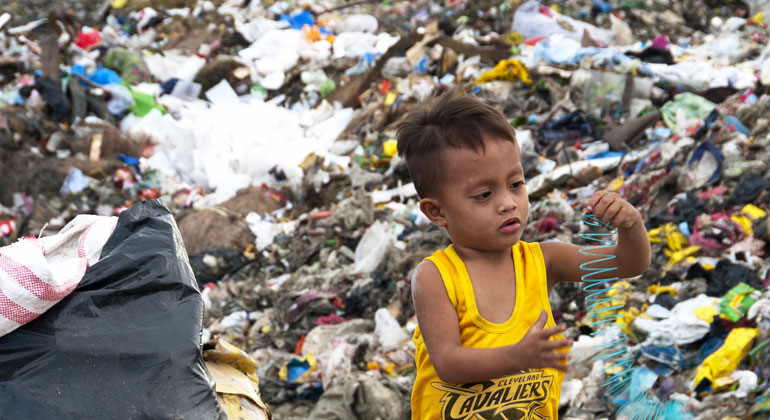Uncollected waste and open burning are leading causes of plastic pollution crisis
A new study from the University shines a light on the enormous scale of uncollected rubbish and open burning of plastic waste in the first ever global plastics pollution inventory.
Researchers used A.I. to model waste management in more than 50,000 municipalities around the world. This model allowed the team to predict how much waste was generated globally and what happens to it.
Their study, published in the journal Nature, calculated a staggering 52 million tonnes of plastic products entered the environment in 2020 – which, laid out in a line, would stretch around the world over 1,500 times.
It also revealed that more than two thirds of the planet’s plastic pollution comes from uncollected rubbish with almost 1.2 billion people — 15% of the global population — living without access to waste collection services.
The findings further show that in 2020 roughly 30 million tonnes of plastics — amounting to 57% of all plastic pollution — was burned in homes, on streets and in dumpsites, without any environmental controls in place. Burning plastic comes with ‘substantial’ threats to human health, including neurodevelopmental, reproductive and birth defects.
The health risks resulting from plastic pollution affect some of the world’s poorest communities, who are powerless to do anything about it. By improving basic solid waste management, we can both massively reduce plastic pollution and improve the lives of billions. Dr Josh Cottom, School of Civil Engineering
The researchers also identified new plastic pollution hotspots, revealing India as the biggest contributor, followed by Nigeria and Indonesia.
Lack of rubbish collection harms health, environment and economy
The researchers believe the study shows access to waste collection should be seen as a basic necessity and a vital aspect of sanitation, alongside water and sewerage services.
While uncontrolled burning of plastic has received very little attention in the past, the new calculations show it to be at least as big a problem as rubbish thrown into the environment, even once uncertainty in the model is taken into consideration.
Dr Costas Velis, academic on Resource Efficiency Systems from the School of Civil Engineering, led the research. He said: “We need to start focusing much, much more on tackling open burning and uncollected waste before more lives are needlessly impacted by plastic pollution. It cannot be ‘out of sight, out of mind’.”
First author Dr Josh Cottom, Research Fellow in Plastics Pollution from the School of Civil Engineering, said: “Uncollected waste is the biggest source of plastic pollution, with at least 1.2 billion people living without waste collection services forced to ‘self-manage’ waste, often by dumping it on land, in rivers, or burning it in open fires.”
Dr Cottom added: “The health risks resulting from plastic pollution affect some of the world’s poorest communities, who are powerless to do anything about it. By improving basic solid waste management, we can both massively reduce plastic pollution and improve the lives of billions.”
This is an urgent global human health issue — an ongoing crisis: people whose waste is not collected have no option but to dump or burn it: setting the plastics on fire may seem to make them ‘disappear’, but in fact the open burning of plastic waste can lead to substantial human health damage including neurodevelopmental, reproductive and birth defects. Dr Costas Velis, School of Civil Engineering
Each year, more than 400 million tonnes of plastic is produced. Many plastic products are single-use, hard to recycle, and can stay in the environment for decades or centuries, often being fragmented into smaller items. Some plastics contain potentially harmful chemical additives which could pose a threat to human health, particularly if they are burned in the open.
New plastic pollution hotspots revealed
According to the paper’s estimated global data for 2020, the worst polluting countries were: India: 9.3 million tonnes — around a fifth of the total amount; Nigeria: 3.5 million tonnes; and Indonesia: 3.4 million tonnes.
China, previously reported to be the worst, is now ranked fourth, with 2.8 million tonnes, as a result of improvements to collecting and processing waste over recent years. The UK was ranked 135, with around 4,000 tonnes per year, with littering the biggest source.
Low and middle-income countries have much lower plastic waste generation, but a large proportion of it is either uncollected or disposed of in dumpsites. India emerges as the largest contributor because it has a large population, roughly 1.4 billion, and much of its waste isn’t collected.
The contrast between plastic waste emissions from the Global North and the Global South is stark. Despite high plastic consumption, macroplastic pollution — pollution from plastic objects larger than 5 millimeters — is a comparatively small issue in the Global North as waste management systems function comprehensively. There, littering is the main cause of macroplastic pollution.
Growing fears for sub-Saharan Africa
While many countries in Sub-Saharan Africa have generally low levels of plastic pollution, they become hotspots when looked at on a per-capita basis with an average 12 kg plastic pollution per person per year, equivalent to over 400 plastic bottles. For comparison, the United Kingdom currently has the per-capita equivalent of less than three plastic bottles per person per year.
Researchers are worried this indicates Sub-Saharan Africa could become the world’s largest source of plastic pollution in the next few decades, because many of its countries have poor waste management and the population is anticipated to grow rapidly.
World needs a ‘Plastics Treaty’ informed by science
Researchers say this first ever global inventory of plastic pollution provides a baseline, comparable to those for climate change emissions, that can be used by policymakers to tackle this looming environmental disaster. They want their work to help policymakers come up with waste management, resource recovery and wider circular economy plans. They also want to see a new, ambitious and legally binding, global ‘Plastics Treaty’ aimed at tackling the sources of plastic pollution.
Dr Velis said: “This is an urgent global human health issue — an ongoing crisis: people whose waste is not collected have no option but to dump or burn it: setting the plastics on fire may seem to make them ‘disappear’, but in fact the open burning of plastic waste can lead to substantial human health damage including neurodevelopmental, reproductive and birth defects; and much wider environmental pollution dispersion.”
Second author Ed Cook, Research Fellow in Circular Economy Systems for Waste Plastics from the School of Civil Engineering, said: “In the past policymakers have struggled to tackle this problem, partly because of the scarcity of good quality data. We hope that our detailed local scale dataset will help decision-makers to allocate scarce resources to address plastic pollution efficiently.”
- The paper, A local-to-global emissions inventory of macroplastic pollution, is published in Nature today. (September 4) DOI: https://doi.org/10.1038/s41586-024-07758-6








